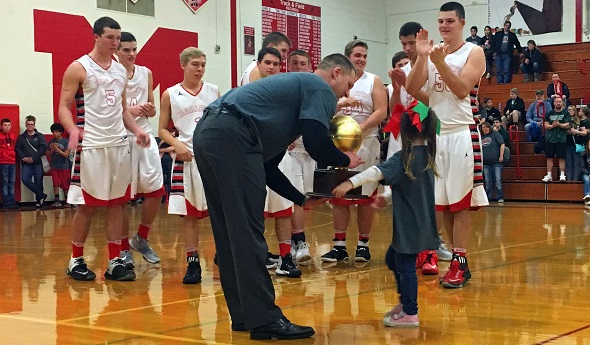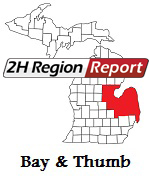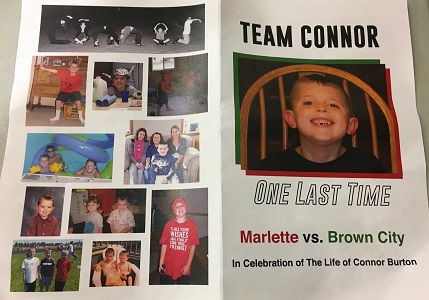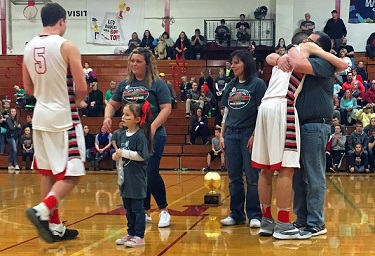
Thumb Rivals Honor Connor 'One Last Time'
By
Paul Costanzo
Special for MHSAA.com
February 28, 2017
Jay Burton said one of his biggest fears after his son Connor passed away in 2009 was that he would be forgotten.
 But eight years after his death, the memory of Connor Burton is as strong as ever in Marlette and Brown City, the two communities he managed to make a big impact on during his 10 years on Earth.
But eight years after his death, the memory of Connor Burton is as strong as ever in Marlette and Brown City, the two communities he managed to make a big impact on during his 10 years on Earth.
“Any parent that’s lost a child, one of the biggest fears is that your child will be forgotten,” Jay Burton said. “They never are, but that’s any parent’s fear. But he’ll be a part of this community for the rest of our lives.”
This past Friday, the two schools met in Marlette for the eighth and final Team Connor Classic, a game that has celebrated Connor’s life since the year after it ended. On this night, Marlette came away with a 49-40 victory, winning the game for the eighth straight time in what would have been Connor’s senior year.
“It’s a good time to call it quits,” Jay Burton said.
Connor’s life
On Thursday, April 16, 2009, Connor went to his gymnastics and baseball practices before shooting baskets outside his house until the sun set and he could no longer see the hoop.
It was a typical day for the energetic 10-year-old, who was described by many as a gym rat and a lover of all sports.
“Whatever sport was in season, he would be ready to play,” said Connor’s uncle Tony Burton, Brown City’s athletic director and former boys basketball coach. “During the winter, basketball was something that was a high priority with him. Obviously, he got taken from us too soon, but he sure loved sports.”
He was good at them, too. His friend Hunter Kelly, now a senior on Marlette’s boys basketball team, said Connor was a better basketball player than most of their friends when they were young.
 In the Thumb, Burtons and basketball are synonymous, and Connor seemed poised to be the next in that line – even if he was coming through the Marlette program and not the Brown City one his uncle was leading and for which his cousins had starred. Connor was even a manager, along with his cousin Caleb Muxlow (who is a senior on this year’s Brown City team), for his uncle’s team.
In the Thumb, Burtons and basketball are synonymous, and Connor seemed poised to be the next in that line – even if he was coming through the Marlette program and not the Brown City one his uncle was leading and for which his cousins had starred. Connor was even a manager, along with his cousin Caleb Muxlow (who is a senior on this year’s Brown City team), for his uncle’s team.
On Friday, April 17, 2009, Connor, who it would be found suffered from Long QT – a heart rhythm disorder – passed away less than 24 hours after shooting his last shot.
“Basically the electrical system in the heart, which tells it to beat, his wasn’t running correctly,” Jay Burton said. “The thing about it was, you would have never known. … I went (into Connor’s room that morning) and the only weird thing he said to me was, ‘Dad, why did you open the door so fast?’
“I didn’t think anything of it, I flicked his light on, and when I came back he hadn’t made it out of bed. He had cardiac arrest.”
A tradition is born
The following basketball season, the Team Connor Classic was born, and the two communities that Connor loved showed their love for him. There were tributes and tears, and a great basketball rivalry was all of a sudden elevated to another level.
“It’s always been a good game between Brown City and Marlette,” Tony Burton said. “We border each other, we’re in the same county, so it’s usually a pretty good game when we play, regardless of records. It means a lot, and for both teams when we play each other, we want to win. But when the game’s over we still have our friendships and our associations with each other.”
While they compete for bragging rights, and often for Greater Thumb Conference East championships, Marlette and Brown City actually have a long history of coming together for good causes.
“Us and Marlette, we have a great relationship,” Brown City High School principal Neil Kohler said. “We do the pink out game in football every other year at our place, we do the Team Connor game. We did a basketball game last year where both teams gathered water for the Flint crisis. So, it’s probably our biggest rival, but also our biggest partnership. When they came to our place about three weeks ago our local rotary did a pancake dinner and had about 400 people come in from Marlette hospice to raise money. The two communities really come together.”
The Team Connor game has a different feeling than most tribute games because of its unique connection of the family to two tight-knit communities.
That was apparent in the latest edition, as Connor’s family – his father, his mother Sue, and his sisters Lindsey and Annie – were given a signed basketball from the Brown City community, and a bouquet of flowers and a blanket tiled with memories from all eight Team Connor Classics from the Marlette community. After the game, the family handed out medals to each player on both teams, receiving from them many long, heartfelt hugs.
It’s not easy for the family, especially in a year when Connor would have been the one on the court with his classmates enjoying a season that has seen the Red Raiders go 18-1 and clinch the GTC East title.
“This is only the second game I’ve watched the Marlette boys play (this season),” Jay Burton said. “I can’t watch them. I see Hunter Kelly; the kid stands a foot taller than me. What would Connor have been? He’s the 10-year-old in front of me and all of his friends are 18 getting ready to graduate high school.
 “Caleb Muxlow, his cousin who plays for Brown City, I can go watch simply because he’s family. But this is only the second time I’ve seen (Marlette) play. It just hurts too much.”
“Caleb Muxlow, his cousin who plays for Brown City, I can go watch simply because he’s family. But this is only the second time I’ve seen (Marlette) play. It just hurts too much.”
Each team came out for warm-ups in the same Team Connor shirts, which combined the green of Brown City and the red of Marlette, and read “One Last Time.” They sat on the court before the game to watch the presentations and a slideshow of photos from Connor’s life and Team Connor Classics past, and stood with one another during the national anthem.
“I think this one was a special night mainly because these were his classmates,” Marlette coach Chris Storm said. “The rivalry has gotten stronger and stronger between us. It was there because of the league before, but it adds a lot of pressure to both teams and you could see that in the game.
“But it means a lot to see how many people come out for the event. The pastor comes back; he’s been out of the area for three years. It’s a great environment for kids to play high school basketball. It’s a District or a Regional feel almost on a regular-season night.”
As the game tipped off, Marlette took the court with four players. It’s a newer, but impactful tradition that was added in the years Connor would have been playing in the game.
“It was quite a surprise (the first year),” Jay Burton said.
It’s a sign that Connor is certainly not forgotten, and while the Team Connor Classic may be going away, anyone who played in one, coached one or simply attended one, will never forget it.
“It means that we’re remembering a great kid that would have given a lot more to his community if he had more time,” Kelly said. “It shows that us as a senior class, the way we represent ourselves as a team and a community, is reflecting who he was. It means a lot because he would have been a senior this year, he probably would have been playing with us. He was better than me, he was better than a lot of these kids, so he probably would have been starting, too.
“So it means a lot to play in remembrance of him, because he’s missing out on all these memories.”
 Paul Costanzo served as a sportswriter at The Port Huron Times Herald from 2006-15, including three years as lead sportswriter, and prior to that as sports editor at the Hillsdale Daily News from 2005-06. He can be reached at [email protected] with story ideas for Genesee, Lapeer, St. Clair, Sanilac, Huron, Tuscola, Saginaw, Bay, Arenac, Midland and Gladwin counties.
Paul Costanzo served as a sportswriter at The Port Huron Times Herald from 2006-15, including three years as lead sportswriter, and prior to that as sports editor at the Hillsdale Daily News from 2005-06. He can be reached at [email protected] with story ideas for Genesee, Lapeer, St. Clair, Sanilac, Huron, Tuscola, Saginaw, Bay, Arenac, Midland and Gladwin counties.
PHOTOS: (Top) Annie Burton, Connor Burton’s younger sister, presents Marlette boys basketball coach Chris Storm with the “Team Connor Classic” trophy after Friday’s game. (Middle) Hunter Kelly hugs Connor’s father Jay Burton as the family welcomes both teams' players. (Below) The game program from the night celebrated Connor Burton’s life and legacy. (Photos by Paul Costanzo.)

Gooding & King Work to Fill SW Michigan's Officiating Ranks, Schedules
By
Pam Shebest
Special for MHSAA.com
December 12, 2023
KALAMAZOO – Cheer them or boo them, without officials, there are no games. That’s just a fact in the sports world.
 Two area men are tasked with supplying those officials for Southwest Michigan schools, and it is not always as easy as it seems.
Two area men are tasked with supplying those officials for Southwest Michigan schools, and it is not always as easy as it seems.
Portage’s Todd Gooding is in charge of assigning football referees for 70 schools across eight leagues, with 500 officials on his staff.
Vicksburg’s Rob King assigns officials for girls and boys basketball in five leagues and has 290 men and women on his roster to work 1,100 games throughout the hoops season.
“We have six females on staff,” King said. “We’re looking to add more. I think the girls who are playing enjoy having a female ref on the court with them, plus it shows them they can do this, too.”
Although totals were dropping a few percentage points every year, the MHSAA still registered an average of 10,317 officials annually during the decade ending in 2019-20. But the beginning of the COVID-19 pandemic that spring played a large part in a decrease in registered officials by 12 percent for 2020-21, down to 8,090.
The last two school years saw a bounce-back of four percent, and recruiting and retaining efforts continue. But Gooding and King – also veteran officials themselves, Gooding for 25 years and King for 24 – and their assigning colleagues across the state have the closest look at the effects of fewer officials as they work to schedule at the local level and make sure everything is covered.
Doing so gets even harder with unforeseen roadblocks.
One of those challenges for Gooding came in August when extreme heat forced most schools to reschedule or delay their football games.
“Everyone was trying to get their games in,” he said. “We were moving start times back, then we were moving days. Football is a little different than basketball or baseball because you can only play within so many days, so we were really squeezed against the schedule.
 “I had a school or two reach out on Monday or Tuesday (before the Friday night game), so they looked ahead at the heat. Some of them waited, waited, waited, and then in some cases, it posed some big challenges because most of those crews had been spoken for.”
“I had a school or two reach out on Monday or Tuesday (before the Friday night game), so they looked ahead at the heat. Some of them waited, waited, waited, and then in some cases, it posed some big challenges because most of those crews had been spoken for.”
For a typical football Friday, Gooding staffs 30 or 35 games, “which is really difficult because everybody wants to play Friday night.”
Some referees in both football and basketball “double dip” by officiating games at freshman or junior varsity levels on nights other than Friday.
Gooding said at one time he hoped to go to seven officials for a football game, but with a shortage of officials, “Right now we’re just lucky to staff five in the games we have, and we’re still very short.
“Parents are a key component to a shortage of officials. A lot of it is more at the youth level, but everyone has to remember the sportsmanship aspect. Without officials there are no games, and sometimes we lose track of that, and that’s one reason there’s a shortage.”
Still, King noted that officiating provides more advantages than disadvantages.
“Everyone hears about the bad stuff, getting yelled at by fans and coaches, but those are so small,” he said.
“After a season of doing this, you learn to block out that stuff and realize it’s just part of the game. Fifty percent of people are mad at you every time you blow the whistle, so you get used to that.”
Pay raises in some leagues enticed many of those who “retired” to return, King said, but both he and Gooding agree the camaraderie developed while officiating is what makes it most special.
“It’s more about the time you spend on the floor with guys, in the locker room, driving to games, grabbing something to eat after the games, just talking about life, just building friendships,” King said. “That’s the part you remember.”
Gooding added some games stick in his memory more than others.
“My first varsity game (refereeing) was Lawton playing Saugatuck,” he said. “I show up and Channel 3 was there. I wondered what’s going on.
“Both schools were 0-8, both senior classes were 0-35. Somebody had to win, and it was my first varsity game. I think Saugatuck won, and it was close to 25 years ago.”
Another memory came as he officiated a basketball game.
 “A girl from Benton Harbor (Kysre Gondrezick in 2016) had 72 points,” he said. “It’s in the record books. and you’re just one small part of that and you remember them.”
“A girl from Benton Harbor (Kysre Gondrezick in 2016) had 72 points,” he said. “It’s in the record books. and you’re just one small part of that and you remember them.”
Officiating is not only for adults. Even teenagers still in high school can become referees as part of the MHSAA Legacy Program.
King recently hosted an officiating summit at Paw Paw for high school athletes.
“There are nine schools in the Wolverine Conference and six of them brought 10 to 15 kids,” he said. “Myself and another official presented on basketball. They also did something on other sports.
“We got the kids up blowing the whistles and doing some of the signals. Three reached out wanting to get involved.”
King said officiating is a great way to earn money, especially while in college.
“You’ll work maybe two or three hours at the most and make $150 to $300 depending on the level,” he said. “Your friends will have to work six-, seven-, eight-hour days to make that much money.
“You can also block your schedule. We have a software with a calendar on it. If there are days you know you can’t work because you have classes or other things, you just block those days out, so you control your own schedule.”
With training, freshmen and sophomores can work junior high/middle school games, and juniors and seniors are able to officiate at the freshman and junior varsity levels.
“Usually what we do is get you a mentor,” King said, “and you work with that mentor and make some money.”
Those Legacy officials hopefully continue in the avocation, eventually becoming the next mentors.
Officiating, like school sports in general, is a cycle that’s constantly in motion – both when it comes to filling the ranks and filling the schedule to cover games ahead.
For example, although football season is over, “I don’t know if there really is an offseason,” Gooding said. “Leagues are going to start giving me their schedules. We’ll get those into an Arbiter system. Everything’s assigned by Arbiter, a computer system where officials get their assignments.
“I’ll start evaluating the crews, reach out to the crew chiefs. They’ll let me know any changes in their crew dynamics. I’ll evaluate the year gone by, how they performed and then start getting ready to work on getting those games staffed. That will start after the new year.”
For more information on officiating, including the Legacy Program, go to the Officials page of MHSAA.com.
 Pam Shebest served as a sportswriter at the Kalamazoo Gazette from 1985-2009 after 11 years part-time with the Gazette while teaching French and English at White Pigeon High School. She can be reached at [email protected] with story ideas for Calhoun, Kalamazoo and Van Buren counties.
Pam Shebest served as a sportswriter at the Kalamazoo Gazette from 1985-2009 after 11 years part-time with the Gazette while teaching French and English at White Pigeon High School. She can be reached at [email protected] with story ideas for Calhoun, Kalamazoo and Van Buren counties.
PHOTOS (Top) Todd Gooding, left and Rob King take a photo together while officiating the Division 4 Final at Ford Field in 2022. (Middle) Gooding signals during that contest between Goodrich and Grand Rapids South Christian. (Below) King officiates the 2019 Division 4 Boys Basketball Final at Breslin Center. (Photos courtesy of Gooding and King.)

